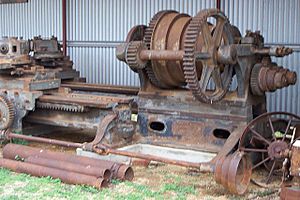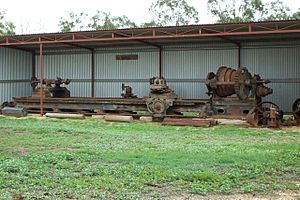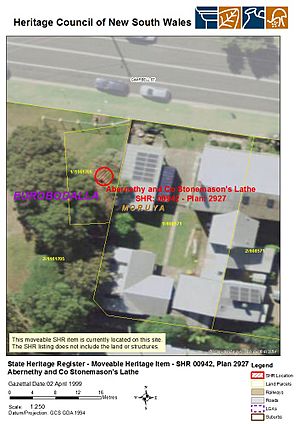Abernethy and Co Stonemason's Lathe facts for kids
Quick facts for kids Abernethy and Co Stonemason's Lathe |
|
|---|---|
 |
|
| Location | Moruya and District Historical Society 85 Campbell Street, Moruya, Eurobodalla Shire, New South Wales, Australia |
| Built | 1881 |
| Owner | Office of Environment and Heritage |
| Official name: Abernethy and Co Stonemason's Lathe | |
| Type | State heritage (movable / collection) |
| Designated | 2 April 1999 |
| Reference no. | 942 |
| Type | Industrial Objects (movable) |
| Category | Manufacturing and Processing |
| Builders | J. Abernethy & Co Aberdeen |
| Lua error in Module:Location_map at line 420: attempt to index field 'wikibase' (a nil value). | |
The Abernethy and Co Stonemason's Lathe is a very old and special machine. It was used to shape large stone columns for famous buildings. This amazing piece of history is located in Moruya, New South Wales, Australia. It was built in 1881 by J. Abernethy & Co in Aberdeen. Today, it is protected as a heritage item, meaning it's an important part of Australia's past. It was added to the New South Wales State Heritage Register on 2 April 1999.
Contents
History of the Stonemason's Lathe
This big machine, called a twin-bed lathe, was made in 1881. It came all the way from Aberdeen to Sydney, Australia. In Sydney, it helped create beautiful stone columns for important buildings. These included the Sydney GPO, the Queen Victoria Building, and the base for the Queen Victoria statue in Queen's Square. The lathe was last used in Sydney in the 1960s.
The Lathe's Journey and Protection
After its working life, the lathe was given to the Lachlan Vintage Village in Forbes around 1977. However, it was later sold at an auction in 1987. People who cared about history, like the Heritage Council of NSW, stepped in. They bought the lathe back to save it. This was important because it is the only machine of its kind known to still exist in Australia.
In 1999, the lathe was officially added to the State Heritage Register. This means it is now legally protected as an important historical item. Later, in 2009, the Heritage Council decided it would be best for the Eurobodalla Shire Council to own and look after the lathe. This council is in the Moruya area, where the lathe is now displayed. The transfer of ownership happened in March 2010.
Where Was the Lathe Used?
Records show the lathe was used in Sydney until the 1960s. It helped create stone columns for many famous Sydney buildings. These include the Sydney GPO, the Queen Victoria Building (built in 1898), Circular Quay railway station (early 1900s), and the Martin Place Savings Bank (1925).
There is some thought that the lathe might have also been used at Louttit's Quarry near the Moruya River. We know it shaped granite from Moruya. In May 2010, the lathe was moved from Forbes to Moruya. This move was a team effort by local community groups and the Eurobodalla Shire Council. They wanted to make sure this important piece of New South Wales' industrial history was saved and displayed for everyone to see.
What the Lathe Looks Like
The Abernethy and Co Stonemason's Lathe is a large machine. It was designed to turn huge stone columns. It is made from strong cast iron parts. It has gears and shafts that help it work. The main part, called the bed, is about 10 metres (33 feet) long. It has special rails that help move the stone into place.
Condition of the Lathe
As of 2010, the lathe was mostly complete. It had been put back together after being taken apart. It is not currently working, but it is being looked after. When it was in Forbes, it had a cover to protect it from the weather. In May 2010, it was moved to Moruya and put back together. It is now getting special treatments to help preserve it.
Changes and Moves Over Time
The lathe was put back together in April 1993. It had been moved to Forbes around 1977 from a stonemason's yard in Sydney. In May 2010, it was moved again from Forbes to Moruya. It is now displayed next to the Moruya Historical Society building. A cover has been built around it to protect it. Local groups are helping to preserve the lathe.
Why This Lathe is Important
The Abernethy and Co Stonemason's Lathe is a rare and important machine from the Victorian era. It was used for almost 100 years. It shows us how technology changed and how people used stone in public buildings back then. It is connected to many famous buildings in Sydney, like the Sydney General Post Office and the Queen Victoria Building. It is also rare because of its large size. It helps us understand how tools were made in the late 1800s.
The lathe was added to the New South Wales State Heritage Register on 2 April 1999 because it meets several important criteria:
- It shows how history unfolded in New South Wales. It is linked to the building of major public works in Sydney during the late 1800s.
- It has a special meaning for people in New South Wales. It shows how popular stone was for buildings at different times.
- It can teach us about the history of New South Wales. It is an example of 19th-century technology that was used for a very long time.
- It is a rare piece of history in New South Wales. It is a very rare stonemason's lathe from the Victorian era. It might even be unique outside of Europe.
See Also
- List of heritage-listed sites in Eurobodalla Shire
 | Delilah Pierce |
 | Gordon Parks |
 | Augusta Savage |
 | Charles Ethan Porter |



